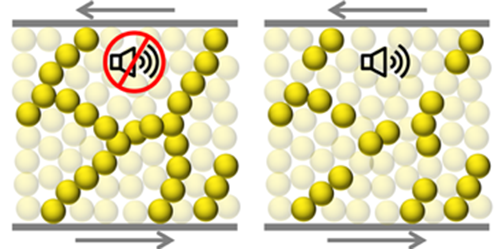Softening Tones Make Shear-Thickening Fluids Relax
Certain gels and pastes become much more viscous when a load is applied to them. This so-called shear thickening can be useful in shock absorbers or soft body armor, where one wants a fluid substance to stiffen at the instant of an impact. However, the high-viscosity state can be a nuisance during the manufacturing process, as it can lead to jamming or clogging of equipment. Prateek Sehgal and colleagues from Cornell University, New York, have found a way to control shear thickening with vibrations. By applying acoustic perturbations to a particle-filled solution, the team was able to reduce the viscosity by a factor of 10.
Shear thickening occurs in many common materials, including cement and a cornstarch-water concoction called oobleck. These substances consist of small particles, such as spherical grains or long polymers, that normally flow around each other. However, when the material experiences a shear stress, some of the particles lock together in a network of “force chains,” causing as much as a 100-fold increase in the material’s viscosity.
Previous attempts to control shear thickening have relied on altering the makeup of the material, which can adversely affect the properties of the final product. For this reason, the Cornell group pursued an “on-demand” method for reducing viscosity that uses vibrations to break the force chains. The team tested their idea on a suspension of micrometer-sized silica particles placed between two parallel plates. The top plate turned to create shear, while a piezoelectric device attached to the bottom plate generated vibrations at a frequency of around 1 MHz. This acoustic signal caused the viscosity of the suspension to drop, sometimes down to its zero-shear viscosity level.
This research is published in Physical Review Letters.
–Michael Schirber
Michael Schirber is a Corresponding Editor for Physics based in Lyon, France.





